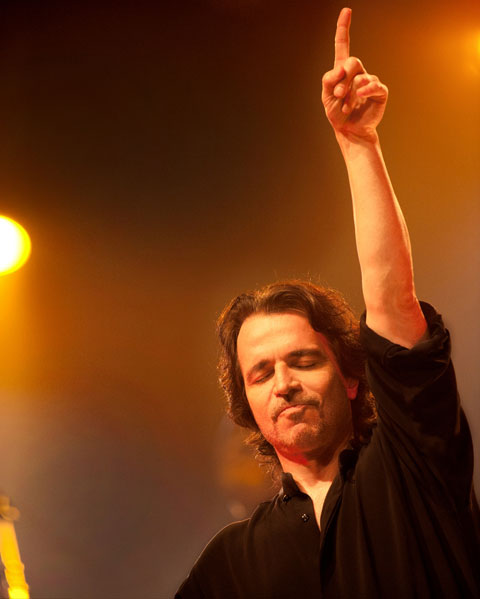 |
We should all be so lucky as to live the Life of Yanni: While the rest of us concern ourselves with mundane day-to-day trials and tribulations wrapped within a greater shell of global anxiety, Yanni has been able to fashion a musical identity where he can pursue genre-defying instrumental music for the gratification of a dedicated worldwide following. The hunky synthmaestro born Yiànnis Hrysomàllis in Kalamata, Greece has, in the past three decades, turned his peculiarly energetic mix of classical, jazz, and aethereal soundscapes into a global megaforce. Following a string of Grammy nominations, his 1994 Live at the Acropolis was the orchestral kaboom heard round the world, an album whose gazillion-platinum success allowed him the privilege to repeat the trick at the Taj Mahal and Beijing's Forbidden City. I caught up with the man himself, relaxing in his Florida home, on a conference call to promote his new tour, which finds him and his orchestra hitting the Lowell Memorial Auditorium on April 6:
You have created an impressive body of work that somehow always manages to sound like "Yanni", which is a feat for mostly instrumental music. Do you feel a pressure to stay true to the Yanni brand when creating new music, like your new album, Truth of Touch? The pressure exists, but I do not accept it. I try to approach my music with no rules. There are no rules. And I demand that kind of freedom, so I never sit down and go, "Oh, let me think, what is selling this year, let me do some of that." Music has to be true, it has to come from you, it has to be what you love, you know? It has to be what turns you on.
Does your music always have to turn you on — and turn on your audience? It's all about excitement. Here's what happens: when you are in a pure creative mode, when you are in the zone, you are completely one thing, you become the music. I don't want to sound all philosophical or whatever, but basically you have to let go. It's required. You let the mind free. It's like you're flying, and when you are hitting something that turns you on, you get goosebumps, it's such a rush, it's very exciting! And that's what I'm hoping to do to the audience, I'm hoping to move them like that, to give them goosebumps, to take them to places like that.
You got started in the rock world — how did you transition to the style of your solo work, and does this rock background inform your subsequent work? Absolutely! Playing rock taught me so much — I came to America from Greece when I was 18, so I have these two cultures inside me. In a way, rock and roll represents the good part of America. It taught me a lot of the culture, and about work! I played it for 12, 13 years, playing 220 to 230 nights a year! When I was with Chameleon [Yanni's late '70s/early '80s US rock band], I'd find time, when we would have some time off, to go into the studio to record my own strange music. These weird little instrumentals, songs that became tracks like "Santorini" and "Nostalgia". I'd listen to what I'd made and think "What is this?" But it was coming out, it was a part of a very strong inner voice in my soul, it was a voice that just had to come out.